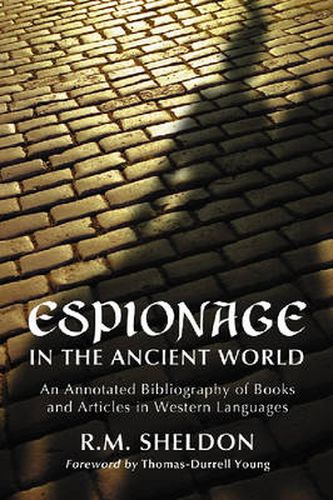Readings Newsletter
Become a Readings Member to make your shopping experience even easier.
Sign in or sign up for free!
You’re not far away from qualifying for FREE standard shipping within Australia
You’ve qualified for FREE standard shipping within Australia
The cart is loading…






This title is printed to order. This book may have been self-published. If so, we cannot guarantee the quality of the content. In the main most books will have gone through the editing process however some may not. We therefore suggest that you be aware of this before ordering this book. If in doubt check either the author or publisher’s details as we are unable to accept any returns unless they are faulty. Please contact us if you have any questions.
Intelligence activities have always been an integral part of statecraft. Ancient governments, like modern ones, realized that to keep their borders safe, control their populations, and keep abreast of political developments abroad, they needed a means to collect the intelligence which enabled them to make informed decisions. Today we are well aware of the damage spies can do.Here, for the first time, is a comprehensive guide to the literature of ancient intelligence. The entries present books and periodical articles in English, French, German, Italian, Spanish, Polish, and Dutch - with annotations in English. These works address such subjects as intelligence collection and analysis (political and military), counterintelligence, espionage, cryptology (Greek and Latin), tradecraft, covert action, and similar topics (it does not include general battle studies and general discussions of foreign policy).Sections are devoted to general espionage, intelligence related to road building, communication, and tradecraft, intelligence in Greece, during the reign of Alexander the Great and in the Hellenistic Age, in the Roman republic, the Roman empire, the Byzantine empire, the Muslim world, and in Russia, China, India, and Africa. The books can be located in libraries in the United States; in cases where volumes are in one library only, the author indicates where they may be found.
$9.00 standard shipping within Australia
FREE standard shipping within Australia for orders over $100.00
Express & International shipping calculated at checkout
Stock availability can be subject to change without notice. We recommend calling the shop or contacting our online team to check availability of low stock items. Please see our Shopping Online page for more details.
This title is printed to order. This book may have been self-published. If so, we cannot guarantee the quality of the content. In the main most books will have gone through the editing process however some may not. We therefore suggest that you be aware of this before ordering this book. If in doubt check either the author or publisher’s details as we are unable to accept any returns unless they are faulty. Please contact us if you have any questions.
Intelligence activities have always been an integral part of statecraft. Ancient governments, like modern ones, realized that to keep their borders safe, control their populations, and keep abreast of political developments abroad, they needed a means to collect the intelligence which enabled them to make informed decisions. Today we are well aware of the damage spies can do.Here, for the first time, is a comprehensive guide to the literature of ancient intelligence. The entries present books and periodical articles in English, French, German, Italian, Spanish, Polish, and Dutch - with annotations in English. These works address such subjects as intelligence collection and analysis (political and military), counterintelligence, espionage, cryptology (Greek and Latin), tradecraft, covert action, and similar topics (it does not include general battle studies and general discussions of foreign policy).Sections are devoted to general espionage, intelligence related to road building, communication, and tradecraft, intelligence in Greece, during the reign of Alexander the Great and in the Hellenistic Age, in the Roman republic, the Roman empire, the Byzantine empire, the Muslim world, and in Russia, China, India, and Africa. The books can be located in libraries in the United States; in cases where volumes are in one library only, the author indicates where they may be found.